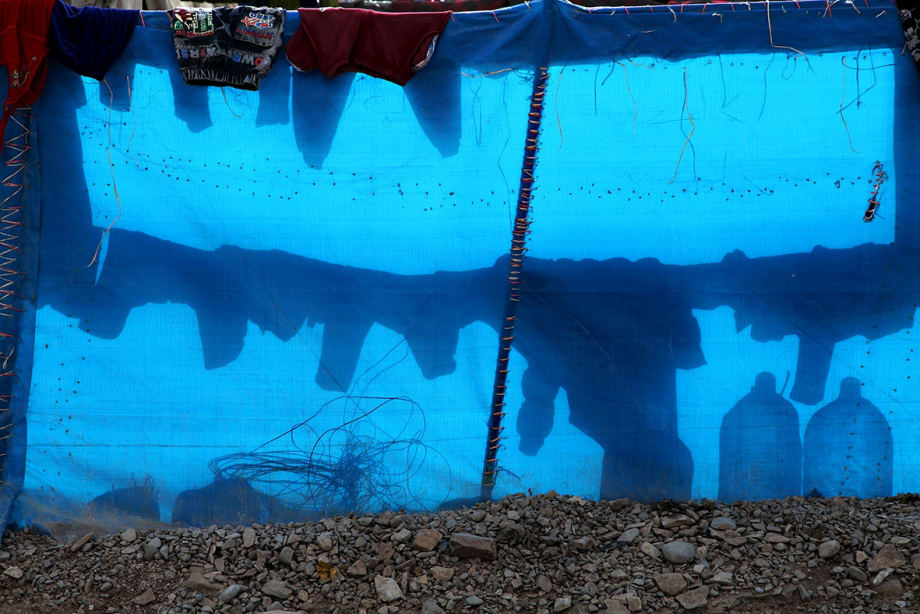Bayjoo’s photographs come from an ongoing project of the artist’s, investigating memorialisation and all its implications – from people to land, and from everyday objects to more literal ‘memorials’ in diverse contexts. Images made on 35mm film take in the winding roads and waterways of Buriganga in Dhaka and Marine Drive in Bombay. For the East India Company during colonial rule, these were crucial sites of extraction and commerce. Today as then, water’s ability to divide one bank from another is answered by its offering passage between them; small boats, little stories in the wake of grand narratives, make their way across lakes and rivers.
Trees, shot in Bangladesh’s northern tea plantations, also speak to the uneasy duality of borders. Between Indian and Myanmar, Bayjoo’s images of Bangladesh speak to the lines scored across swathes of land under colonisation. In one image, an ancient tree sits behind a small concrete wall; a memorial to what has already disappeared, and a gesture of ownership imposed on the landscape. In a colonial Goan house, Bayjoo brings his investigation to the interior – and explicitly human – face of memorial. Household objects are framed as monoliths before his camera’s lens, presenting evidence of what lingers and how we bend our lives around its legacy. What can we learn about ourselves by looking at what we can’t discard?
Mario Macilau presents work from his new series Carvão. Shot in stark black and white, Macilau’s images provide a glimpse into an appropriately bleak world– carvão translates to ‘coal’, and the artist has spent the last two years documenting Mozambican communities whose livelihoods depend on it while being threatened by the facts of its production. Caught between the urgent necessity of supporting families in a country where costs of living have soared with globalisation, and rising alarm as Mozambique’s forests are decimated to supply the trade, Macilau’s camera catches the microcosms of subjectivity in the midst of nationwide turbulence.
With deforestation in Mozambique, people produce charcoal from trees. [… ] They cut down wood in the forests to be able to survive, using it to make boats, build their houses, cook, or to sell and contribute to the local economy. In Mozambique, wood exploitation is increasing; the number of trees chopped down for coal production multiplies day by day – Mario Macilau
Rushdi Anwar’s photographs come from his series I AM NOT FROM EAST OR WEST... MY PLACE IS PLACELESS, 2016-2018. Spending months at a time in refugee camps, Anwar’s project follows the 1.8 million people and counting who have fled regional conflict for Iraq’s Kurdistan region. Aiming to spotlight the commonality of displacement, and to document the living conditions of refugees inside the camps, Anwar’s series investigates the idea of ‘home’ in the context of such upheaval. His camera touches those fragments which are conspicuous by their absence, left behind in another incarnation of ‘home’, as well as those built via the triumph of memory.
NOTES TO EDITORS:
Shiraz Bayjoo (b. Mauritius, lives and works in London) is a contemporary multi-disciplinary artist who works with film, painting, photography, performance, and installation. His research-based practice focuses on personal and public archives addressing cultural memory and postcolonial nationhood in manner that challenges dominant cultural narrative. Bayjoo studied at the University of Wales Institute, Cardiff. He was artist in residence at Whitechapel Gallery in 2011 and has exhibited with Tate Britain and the Institute of International Visual Arts (Iniva). He is a recipient of the Gasworks fellowship and the UK Arts Council grants for the arts.
Mário Macilau (b. Mozambique, lives and works in Maputo) is a multi-disciplinary artist best known for his photography. Macilau specialises in long-term photography projects and series that address the complex realities of human labour and environmental conditions. Macilau started his journey as a photographer in 2003 from the streets of Maputo, trading his mother's cell phone for his first camera in 2007. Macilau has been shortlisted for the 2019 Mast Award and the was a finalist of the Unicef Photo of the Year in 2009, the Greenpeace Photo Award 2016, and is in the permanent collection of the Pompidou Centre.
Rushdi Anwar (b. Kurdistan, lives and works between Australia and Thailand) makes work which reflects on the socio-political issues of Kurdistan, Iraq and the Middle East. He poetically draws on personal experience and memory concerning contemporary issues of displacement, identity, conflicts, trauma and impact of colonialism. Based on his background as a Kurd who has lived through recent violence of the region, Anwar’s work references geopolitical unrest both recent and historical, extending to generate discourse about the status of social equity through an investigation of form, material and processes of making. His installation, sculpture, painting, photography and video practice recalls the everyday plight of socio-political persecution, fundamentally expressing the necessity for care, attention and redemption.
Ed Cross Fine Art works with emerging and established artists across and beyond the African diaspora. The gallery seeks to stage conversations – between practitioners, international audiences and as guided by its artists – to amplify voices historically silenced, and to create space for their independent development. Since launching in 2009, Ed Cross Fine Art has held exhibitions across the world: from New York to Paris, and London to Lagos, the gallery continues to build on its values of cooperation and curiosity.


